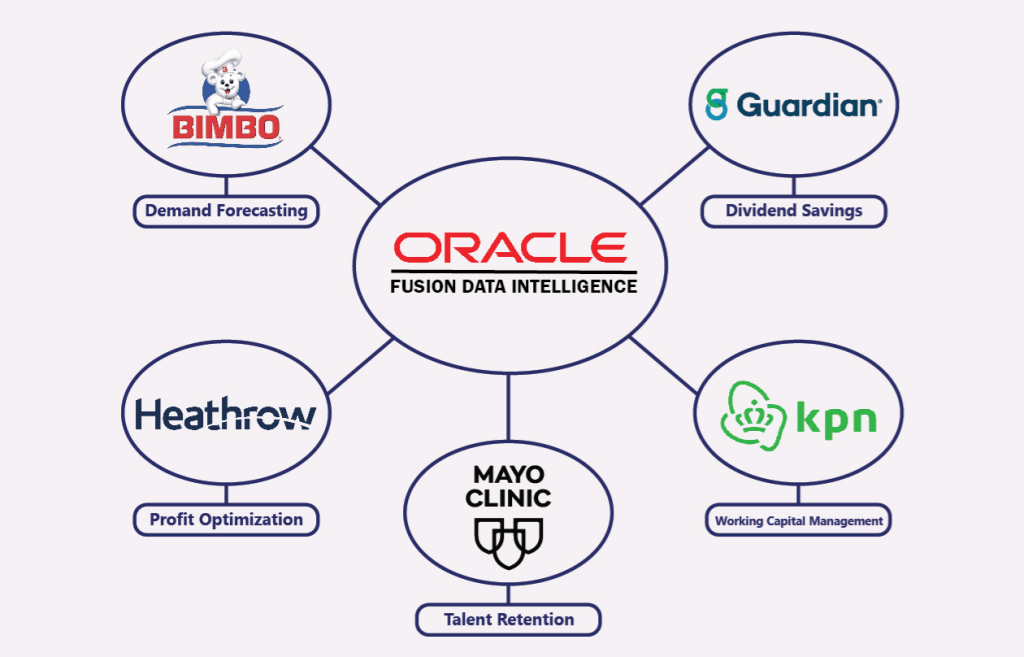Oracle is ratcheting up turnkey AI capabilities across an extensive product portfolio by adding tangible value to its Analytics and Fusion Applications offerings with simplicity that stand in contrast to nonstop branding and pricing tweaks from its competitors.
During recent back-to-back briefings, Oracle is touting the extra benefits for customers running Oracle Analytics Cloud (OAC) and its Fusion Applications through Fusion Data Intelligence (FDI), an advanced analytics engine for data visualization and business insights that also come with built-in AI services like summarization, search and recommendations. OAC, which powers FDI, supports popular large language models such as OpenAI and Cohere.
Such enhancements enable Fusion Applications customers including Mayo Clinic to leapfrog its peers by automating shift scheduling with embedded analytics and AI recommendations, optimizing staffing needs and costs through better retention, while sustaining overall productivity gains for the premier healthcare provider.
Another Oracle customer Biofy experienced over 50% performance boost when using such simple AI services through the Oracle Cloud Infrastructure to reduce time to under four hours from five days previously when validating antibiotic resistance in genetic sequencing studies.
Table 1: Oracle Fusion Data Intelligence (FDI) Tangible Value
| Customer | Industry | Fusion Data Intelligence Use Cases |
|---|---|---|
| Grupo Bimbo | Consumer Packaged Goods | Demand Forecasting |
| Guardian Life Insurance | Insurance | Dividend Savings |
| Heathrow Airport | Transportation | Profit Optimization |
| KPN | Communications | Working Capital Management |
| Mayo Clinic | Healthcare | Talent Retention |
Joey Fitts, group vice president of Oracle Analytics, said the product has tripled its growth since 2023 riding on the strengths of Oracle Analytics Cloud and off-the-shelf Gen AI tools for retrieval augmented generation, natural language processing and custom agent development, all of which are becoming available with Oracle Database 23ai as part of Oracle Cloud Infrastructure.
FDI use cases are proliferating across customers running Fusion Applications for customer experience, enterprise resource planning, HR, NetSuite Financial Management, supply chain transformation, as well as industry specific solutions for energy, utility and healthcare verticals, Fitts added. Other upcoming FDI applications will cover supply chain command center and workforce spend analysis.
Another value add is that Oracle is relying on native connectors to expose third-party applications like Salesforce within its FDI for reporting and dashboarding, rendering the use of popular visualization tools like Tableau obsolete for Oracle customers.
The healthcare and life science industries are so strategic to Oracle that T.K. Anand, who heads its analytics development, has recently been given the additional responsibilities to expand the use of analytics and data intelligence for the above verticals.
Unlike rivals that seek to monetize Gen AI by nickel and diming transactions, conversations, and agent interactions, Oracle is more interested in cross-selling and upselling of database workloads, analytics utilization, AI services for custom agent development and most importantly its full suite of enterprise applications that serve as the backstop for every digital agent being put to work.

Chris Leone, executive vice president of Oracle application development, said the vendor has delivered over 150 Gen AI and AI Agent capabilities such as job posting agents for HR, service and sales agents for customer engagement, and supply chain agents for proposal writing. Leone expects the number to skyrocket with the recent introduction of Oracle Agent Studio that allows customers to quickly deploy agents with pre-built templates that map to their business process requirements from employee compensation to payment processing.
All these agents and their features, in addition to Agent Studio, are available at no extra cost to Oracle Fusion Applications customers to drive instant value, Leone said, bracing for rapid adoption as Oracle ramps up its own agent delivery and Agent Studio updates as frequently as every other week.
Simply speaking, Oracle is using natural language to put these digital agents to work without requiring coding and prior knowledge of AI development as Leone demonstrated during the briefing. With easy-to-use templates, customers can build agents for product information management and parts maintenance and repair, all deriving from their own proprietary applications data, Leone said.
Eschewing branding efforts behind a dedicated digital agent, Oracle’s simplicity messaging may well be what customers are asking for – no frills and no extra expenses for deploying agents. That is in sharp contrast to the repeated tweaks that Microsoft has made to its Copilot positioning and packaging, followed by the recent pricing changes at Salesforce Agentforce.
List of Oracle Fusion Intelligence Customers
Source: APPS RUN THE WORLD Technographics Platform, June 2025



